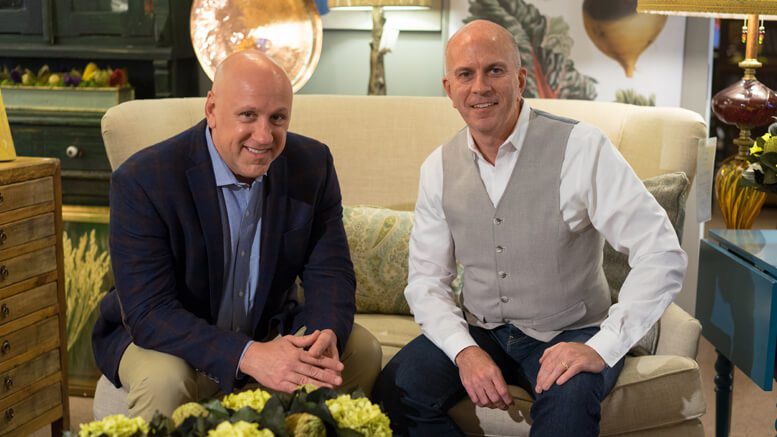The first thing you need to know about The Farmhouse Store, the wildly popular furniture store of celebrities, Millennials and every consumer in between, is that it was never supposed to be a furniture store.
Ed Menapace started out raising “our baby”, as he lovingly calls his store, as a gift shop. “That’s what I always thought we’d be, was in the gift business,” he says. “But things have a way of changing, I guess. Sometimes good, sometimes bad. I love that these days we’re known as much for furniture as we are for gifts.”
Here we should pause to inform you that, these days if there’s one thing Menapace knows, it’s furniture. His Westfield, N.J., store—packed with some of the most eclectic collections of modern farmhouse living—and his appearances on HGTV are testament to that. We should also tell you if there’s a second thing Menapace knows, it’s change. While most furniture retailers are lifers, Menapace, came to this place in life later than others. He started out as a Broadway ballet dancer, not the typical pedigree for a furniture retailer. But, if you haven’t figured it out already, this is a story about change. Not just embracing it, but thriving in the face of it.
“Some people are afraid to try something different,” says Menapace. “I’m not knocking people who think that way, but I just can’t live like that. That’s not who I am.”
Tracing The Farmhouse Store’s roots takes you back more than a decade after Menapace had traded in pointe shoes for wingtips and a job with the House of Denmark in Atlanta. After a few years, Menapace did not like what he was seeing. The seismic shift in furniture manufacturing from the U.S. to Asia had changed the business he grew to love.
The ruin caused to U.S. furniture manufacturing by a tsunami of Chinese goods forced hundreds of factories in North Carolina, Virginia and other furniture centers around the country to close or move production offshore. It wasn’t just the lost jobs Menapace lamented, it was the lost relationships built within the industry. “That’s when I decided to open my own shop,” he says. “I liked knowing who I was working with and building a lasting relationship with them, and I figured the only way to control that was to have my own store.”
He opened The Farmhouse Store in a tiny storefront in 2007 in Westfield. At first, the store sold pottery, woodwork and jewelry. Business was fine, but change was on the way.
Menapace was traveling through the Amish country of Pennsylvania one weekend when he met two brothers who were taking down old barns and reclaiming the wood to make primitive unpainted furniture designs. The designs were simple and seemed to complement the down-home look of his store so he crammed his Mini Cooper with six chairs, took them home, and put them in the store. They sold immediately.
“That was my lightbulb moment,” Menapace recalls. A few weeks later Menapace went back to the Amish country. Only this time he showed up with a Penske truck.
He filled it with furniture and the quaint gift and jewelry store Menapace envisioned would forever be changed. Menapace’s husband, Bill Curtis, knew his spouse was serious about furniture when he came home one evening and found a Penske truck in the driveway where Menapace’s beloved Mini Cooper used to reside.
Menapace was all in. Eventually he convinced Curtis, who spent his weekends working behind the store’s cash register, to quit his corporate job at an insurance company and join him full-time in retail, and they’ve never looked back.
“Ed has a way of persuading and empowering people, making them think they can do anything,” says Bill. “He’s that way with me. Part of me was skeptical, but my partner encouraged me to try something different and I’m glad I did.”
More change came in 2010 when Menapace and Curtis had a chance to grow the company. A retail building opened on Broad Street, Westfield’s main commercial thoroughfare. Geographically, the difference between the old store and the new one was three blocks, but the environments were worlds apart. The new location was surrounded by national retailers. Menapace and Curtis would be leaving behind a 1,500-square foot store that had a local frozen yogurt store as a neighbor. The new 3,000-square-foot store was wedged between stores like Coach and Banana Republic.
Menapace crunched the numbers and decided to take another chance. Curtis says it was a rare instance in which a retailer was happy to be in a recession. “The only way we could afford (the new space) was because the recession dropped the prices on commercial real estate,” he says. “It was a gamble, but it was also an easy decision to make. We could see the growth coming so we jumped.”
Just like that, The Farmhouse Store doubled its size. And when consulting firm Deloitte moved out of their second-floor above them, The Farmhouse Store grew again, this time to 10,000 square feet, enabling Menapace and Curtis to expand deeper into home furnishings. Today the store’s second floor features handmade and reclaimed barn wood furniture, American-made upholstery, rugs, lighting and more—all without losing its original Farmhouse Store look.
The store prides itself on its forward-fashion upholstery from manufacturers like Rowe, Klaussner and Best Home Furnishings. It carries hand-made dining tables from the Amish and Mennonite communities in Pennsylvania and Ohio, and rugs from Dash and Albert, Capel and Loloi. The bright coral sofa might not be for everyone, says Menapace, but it inspires customers to want to be part of The Farmhouse Store’s story of unique and eclectic items for the home.
“It’s like the jeweler who puts a big diamond ring in the display case,” says Menapace. “Everyone sees it and admires it, but nobody buys it. Instead they buy all the other little pieces around it because it inspired them. That’s what we’re doing here. I like to think we’re inspiring our customers. If people walk out of the store with a beige chair, they still feel a part of what we’re doing here.”
It’s Menapace and Curtis’ eye for the unique country item that has won over so many followers in a region that is anything but rural. The store has even made appearances on HGTV shows like Dina’s Party and Fixer Upper, which has only expanded its brand even more.
But like most furniture retailers, The Farmhouse Store thrives on its local traffic. Westfield has a mix of independent stores and boutiques as well as national stores. According to the city’s Chamber of Commerce, more than one-third of the retailers and restaurants have been a part of downtown for at least 25 years.
“There’s a lot of customer loyalty in this town,” Menapace says. “People return over and over to their favorite stores and restaurants, but stores aren’t just given that loyalty. We have to earn it.”
Curtis says that loyalty starts with hiring the right people. “They have to have the passion for The Farmhouse,” he says. “That’s different, I think, than having a passion for just retail, because we’re not just any other store. We want people who know and appreciate that we’re a little different and will celebrate that with the customers.”
To that end, Curtis says employees are trained to get to know the customers that walk through the front door every day—not just their needs, but who they are as people. “You’d be surprised how much our employees know about the regulars who show up every week or every other week. I think that pays off in the end. I can’t tell you how many times people have told me, ‘I love this store!’ I can promise you that in 15 years working in the insurance industry nobody ever came up to me and said those words.”
On a recent Saturday morning, the sales staff was charged with heading out through Westfield’s bustling downtown to shop other stores and learn what others are doing right and, just as important, what they are doing wrong.
“Because sometimes we don’t see what we’re doing or not doing until we see it in others,” Menapace says. “Look, we have great people, but they can always be greater. Bill and I can always be better too. It doesn’t matter what you’re doing in our store—sales, design, warehouse, buying—if you’re not changing or have the willingness to change, you’re not growing.”
What HFA Means to Me
It was obvious that just through the buying program alone I would be paying for my membership in the first year. And not just membership, but the cost of going to conference and so much more. That’s the financial side to joining. I was amazed when I went to the HFA Networking Conference at how so many people were willing to meet with me, talk with me and share ideas about their company and offer suggestions about mine. You really can’t put a price on that kind of information.
Ed Menapace
The Farmhouse Store, Westfield, N.J.










